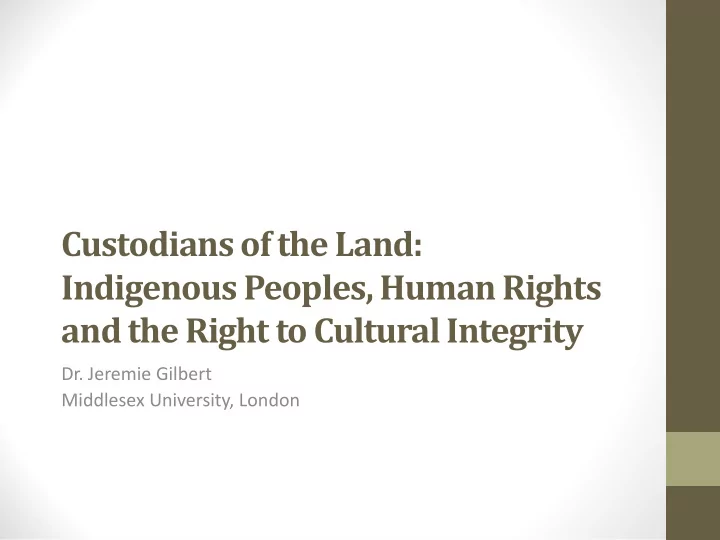

Custodians of the Land: Indigenous Peoples, Human Rights and the Right to Cultural Integrity Dr. Jeremie Gilbert Middlesex University, London
Why a Right to Cultural Integrity? • Indigenous Peoples as Custodians of the Land 1. The Property Rights Approach 2. The ‘Cultural Way of Life Approach’ 3. The ‘Cultural Heritage Approach’ • Daes Study (1993-2000) • ‘categorisation’ of elements such as songs, stories, sciences or sacred sites, and this would imply giving different levels of protection to different elements of heritage. • Recognising the holistic cultural approach to land rights, the study raises issues regarding the inadequacy of the watertight legal regime of protection for cultural heritage.
A Right to Cultural Integrity? • Does not appear in any treaty (as such) • Specific to indigenous peoples • Slow jurisprudential emergence
The IACHR Approach • Awas Tingni: property rights covers ‘social integrity’ of community • Saramaka: ‘integrity of the land’ • A bundle of rights: right to property, the right to life, and right to health.
The African Commission approach • Endorois community claimed that access to their ancestral territory “in addition to securing subsistence and livelihood, is seen as sacred, being inextricably linked to the cultural integrity of the community and its traditional way of life.” • Legally, the Endorois claimed that their eviction meant a violation of their right to practice their own religion ( Article 8 ), their right to culture ( Article 17 ) and their right to access natural resources ( Article 21 ). • Commission concluded on a violation to the right to cultural integrity
Importance? • Capture a missing international standard, a bridge between several rights • Reflects a holistic approach to cultural rights • So far: property rights, cultural rights, right to health, right to religious freedom, next step language rights?
Related Issues • Private sector? • FPIC implies conducting consultations/negotiations in indigenous languages • Remedies/Reparations: cf. Saramaka implementation order • Indigenous Languages in demarcation and mapping of lands
Recommend
More recommend